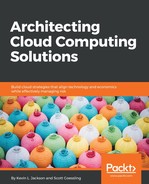DevOps combines cultural philosophies, practices, and tools to increase an organization's ability to deliver applications and services at high velocity. Accelerated velocity is accomplished by evolving and improving products at a faster pace than organizations using traditional software development and infrastructure management processes. DevOps uses a concept referred to as Infrastructure as a Code where scripting is used to instantiate cloud-based infrastructure through the use of APIs. The primary tools for configuration management are the following:
- Chef: Uses Ruby, a domain-specific language (DSL), to write system configuration recipes. Chef installation uses a workstation to control the master. Agents are installed using the knife tool with SSH. Managed nodes authenticate with the master using certificates.
- Puppet: Used to manage data center orchestration. It works with many operating systems and provides operational support tools for major OSes. Setup requires a master server and client agents on each managed system. Modules and configurations use a Puppet-specific language based on Ruby.
- Ansible: Ansible requires no node agent installation to manage configurations. It uses Python with an installation through a GIT repository clone. All functions use SSH. Ansible node management requires appending SSH authorized keys to each node.
- Salt: A command-line interface (CLI) tool that uses a push method for client communication. It is installed on Git or the package management system. Salt communicates through general SSH. It also includes an asynchronous file server for speeding up file serving. Python or PyDSL are used to write custom modules.
